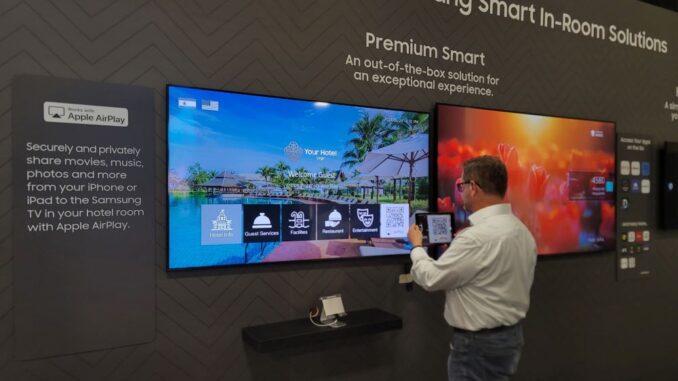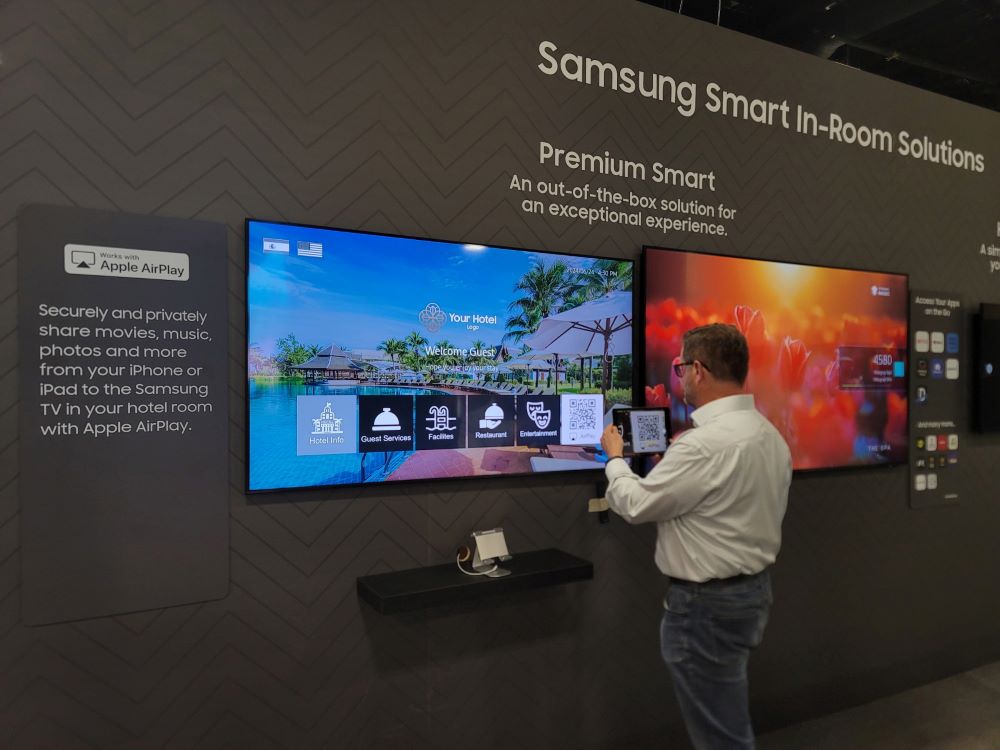
By Orit Naomi, HTN staff writer – 6.28.2024
The challenge of accommodating diverse hotel guest preferences is ever-present. One such challenge is the technological divide between Apple and Android users, particularly when it comes to casting content from mobile devices to TV screens. This issue is not just a domestic inconvenience but a significant consideration for the hospitality industry, which aims to provide seamless experiences for all guests.
Traditionally, households with all members using Apple devices have relied on Apple’s AirPlay technology for casting content to TVs. AirPlay, whether embedded in smart TVs or accessed via Apple TV or other compatible devices, allows Apple products to screenshare or play content on the largest screen in the home. Conversely, all-Android households use Google Cast, integrated into smart TVs or accessed through Android TV/Google TV streaming devices like the Nvidia Shield or the Onn 4K Pro.
However, the real challenge arises in mixed-device households, where some members use Apple devices and others use Android. AirPlay is exclusive to Apple devices, while Google Cast, although more open, is primarily integrated into the Android ecosystem but also available on iOS devices and web browsers. This technological schism often leads to a cumbersome experience, requiring multiple devices and remotes to accommodate different casting technologies.
This issue is particularly relevant in hotel settings, where guests arrive with a variety of devices and expect seamless connectivity. At this week’s HITEC 2024 tradeshow in Charlotte, N.C., major advancements were showcased by Samsung and LG in their new hospitality TVs. Both companies announced built-in casting capabilities via AirPlay and Google Cast, signaling a big improvement in guest room technology.
Historically, hospitality TVs have lagged behind consumer models in terms of features and specifications. While Google Cast has been available in hotels for several years, it often required third-party devices or HDMI dongles, adding cost and complexity for hotels. AirPlay support in hotels has been inconsistent, further complicating the guest experience.
Samsung’s announcement that its hotel TVs will now be AirPlay-compatible, despite still requiring a dongle for Google Cast, marks a notable advancement. LG, which introduced AirPlay on hotel TVs in 2023, revealed that the Hyatt hotel chain will be the first to receive its new Google Cast-capable models.
These developments promise to streamline the casting experience for guests, regardless of their device preferences. “Samsung is committed to building a robust and connected ecosystem that enhances convenience, usability, and overall guest experience,” said Hoon Chung, Executive Vice President of Visual Display Business at Samsung Electronics, in a company press statement. “AirPlay allows both iPhone and iPad users to easily share their favorite content on the big screen in their hotel room, making their temporary stay at a hotel feel more like home. LYNK Cloud and SmartThings Pro also give hotel management better business insights while making their operations more seamless and efficient.”
Hyatt, in collaboration with SONIFI, a casting partner that services over 500,000 industry rooms, is facilitating the implementation of LG-Google’s next-generation casting solution in new and existing Hyatt hotels globally. Guests will reportedly be able to establish a cast connection quickly by using a QR code displayed on the TV. This will allow them to wirelessly stream videos, music, and more from their devices. In addition to using their mobile devices, guests can also control playback, track selection, and volume with the TV remote, ensuring a “simple and familiar” user experience. Upon checkout, devices will automatically reset to maintain privacy and security.
The company stated that the 2024 LG Pro:Centric smart hotel TVs will receive the new Google Cast feature through a software update later this year. As a leading television provider to the U.S. lodging and hospitality industry, LG offers a range of smart hotel TVs from 43 inches to 75 inches, with up to 4K resolution, suitable for various spaces from standard guestrooms to penthouse suites. The LG Pro:Centric Smart software supports modern solutions, including content streaming, interface customization, and networked digital signage capabilities.
The ultimate solution may lie in a technology designed for cross-platform casting: Matter Casting. Developed collaboratively by major tech companies, including Google and Apple, Matter Casting uses the open-source and royalty-free Matter connectivity standard to provide a universal casting platform. This technology aims to work seamlessly with any device, eliminating the need for multiple casting solutions.
Apple already supports Matter through its Apple Home app, with several devices acting as Matter hubs. Google’s Google Home app also supports Matter, and many of its smart devices can function as Matter hubs. The potential for Matter Casting to be integrated into home and hotel TVs is hinted at in Samsung’s press release, which notes that Matter and the Home Connectivity Alliance (HCA) can be connected to SmartThings Pro. Since SmartThings Pro is built into Samsung’s new hotel TVs, there is hope that any device will eventually be able to cast to these screens.
The hospitality industry stands to benefit significantly from these advancements. By adopting technologies like Matter Casting, hotels can offer a more inclusive and seamless casting experience for all guests, regardless of their device ecosystem. This not only enhances guest satisfaction but also simplifies the technological infrastructure required to support diverse casting needs.
The integration of both Apple AirPlay and Google Cast into new hotel TVs by Samsung and LG represents a big step forward in addressing the technological divide between Apple and Android users. The potential adoption of Matter Casting further promises to unify casting capabilities across all devices, providing a truly seamless experience for hotel guests.



